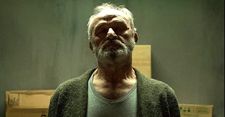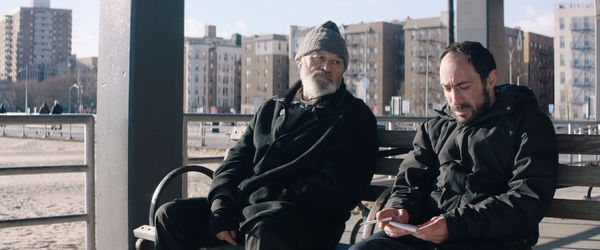 |
| Kakhi (Levan Tediashvili) with his son Soso (Giorgi Tabidze) at Brooklyn’s Brighton Beach in Levan Koguashvili’s Brighton 4th, a Tribeca Film Festival highlight Photo: Kino Iberica |
The Tribeca Film Festival International Narrative Competition jury comprised of Alexander Payne, Melissa Leo, Delroy Lindo, Peter Scarlet, and Lesli Klainberg awarded Best Film to Levan Koguashvili’s Brighton 4th, produced by Irakli Rodonaya, Olena Yershova, Michel Merkt, Kateryna Merkt. Best Screenplay went to Boris Frumin, and Best Actor to Levan Tediashvili.
In the first instalment of my conversation with Levan Koguashvili, we discussed his love of Italian Neorealism, working with the amazing Phedon Papamichael, Women from Georgia, Georgian painter Niko Pirosmani, Frédéric Boyer, Sophia Loren in Lady Liberty, Kakhi Kavsadze and when Georgian men sing, and the comedy of cheese.
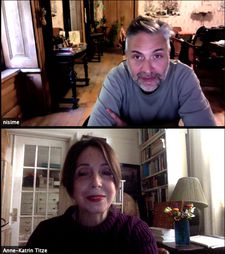 |
| Levan Koguashvili with Anne-Katrin Titze: “My heart for sure belongs to Italian Neorealism and all those great movies.” |
When we first drop in on an unruly crowd of Georgian men watching soccer in a sports parlour in Tbilisi, it is still unclear which one of them we will be allowed to follow, as though the camera were in the middle of picking a hero. A trip to the market (with pears in season) where Kakhi (Levan Tediashvili) and his brother (Temur Gvalia) buy an exorbitant amount of local cheese, brings us one step closer to this extraordinary film’s destination.
Brighton Beach, nestled at the ocean right next to Coney Island, is where Kakhi , a former Georgian wrestling champion (as is the actor who plays him), is headed. His son Soso (Giorgi Tabidze) is in trouble and he embarks on setting him straight. In a boarding house led by his sister-in-law, where his son resides, Kakhi makes the acquaintance of an illustrious group of emigrants, all trying to survive in an environment marked at the ends of the spectrum by corruption and song. With the help of Phedon Papamichael’s exquisite cinematography, the film takes flight without ever losing its footing in quotidian reality.
From Tbilisi, Levan Koguashvili joined me on Zoom for an in-depth conversation on Brighton 4th.
Anne-Katrin Titze: Hi, nice speaking to you! Are you in Georgia?
Levan Koguashvili: Yes, I just arrived this morning. A little jet lagged.
AKT: How is it there? How do you feel?
LK: It’s hot. My family is on the seaside waiting for me. I have to stay for three days in isolation. It’s good to be home, especially with a couple of awards.
AKT: Yes, first of all, congratulations for your Tribeca wins, very well deserved.
LK: Thank you so much.
AKT: Let’s start with the beginning of your film. It’s so impressive how you’re setting it all up. There is this sports place and all of these men talking and we have no idea which one of them we are going to follow. It puts us on our toes, we see a spectrum of different personalities. Did you always know you wanted to start this way?
LK: First of all, thank you. I always strongly believed that you have to start a film with a strong scene. Maybe in this case it was more the idea than following a structure very carefully. In the original script there were only a couple of sentences that said: men are watching a football match in this betting house and they’re anxious. That’s it, basically. It was the introduction of this character, the brother of the main guy and he is losing money. That’s it.
I always went to the places I want to shoot and spend some time there. I went there many times. I’m not a big football fan, I watch games here and there, but not that I’m a big soccer fan. But I was mesmerized by the faces, gestures, emotions, desperation of these people. And the acting. You know, they’re acting all the time.
AKT: They express their masculinity.
LK: Yes, masculinity. The biggest irony on the masculinity is that they usually gamble on the money their wives sent them. I made this documentary, my thesis film for NYU, called Women From Georgia. It’s a group portrait of women working in America, taking care of elderly people, working very hard supporting their families in Georgia.
AKT: You include that element in this film, too.
LK: Yes. I know this subject pretty well. So basically my thesis film was about women working abroad and now this is a film about men who stayed at home. It’s masculinity’s irony because it doesn’t really mean masculinity when you gamble away money sent by your wife.
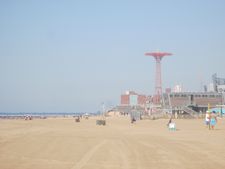 |
| Brighton Beach in Brooklyn, New York Photo: Anne-Katrin Titze |
AKT: That’s why there’s so much acting involved. The too-muchness of the Georgian women! The next scenes are as fantastic as the beginning. I loved the market sequence. Phedon Papamichael does a fantastic job of filming the butcher, the piles of pears, and then the mysterious cheese scene. You wonder, why so much cheese? Who needs this amount of cheese? There is a film with Sophia Loren from the Seventies, called Lady Liberty, where she arrives at the airport in New York with a mortadella, a gigantic sausage. She is stopped by customs and can’t get through and she starts feeding the whole airport with that mortadella because she doesn’t want to throw it away. That’s what I kept thinking about with your cheese.
LK: In the Soviet Union, Georgia was called the Italy of Soviet Union. Because of mentality, because of culture, because of food and wine, and the way they articulate themselves. Your example of the Sophia Loren movie, which I haven’t seen, but I will try to watch. I love Italian cinema. My heart for sure belongs to Italian Neorealism and all those great movies. I think the similarities are striking. Yes, working with Phedon was amazing. The way he handles light, you know, composition and framing. With the market it’s always how you decide to handle a certain sequence. With the market I was a little bit confused.
There’s a Georgian painter, Niko Pirosmani, one of the key Georgian artists probably throughout history. He is early 20th century and I remembered some of his paintings. In his paintings people are always looking into the audience directly. It’s a kind of formality, which has some strange mystical element. It’s naive and very deep at the same time. That was the assignment for the scene. I told Phedon, let’s do it like Pirosmani tableaux: facing still life with a seller. Pirosmani and Phedon Papamichael and the comedy of cheese.
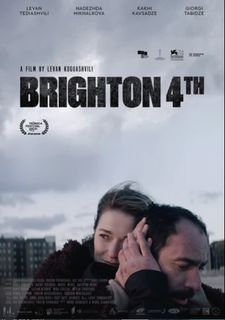 |
| Brighton 4th poster |
AKT: Comedy of cheese!
LK: It’s also from my student years, because there were so many people who had their relatives in the United States, so they said can you bring some cheese for my son or my wife or my brother? And I was constantly taking this cheese back and forth to New York.
AKT: The first person who mentioned your film to me was Frédéric Boyer, when I did a conversation with him before the festival, Zoom from Paris. And he said, you know, you have to see Brighton 4th, which led to a conversation about films from Georgia and how they are all so good. There’s something in the air.
LK: Thank you so much. We are very grateful to Frédéric because he was a very big supporter of the film from the beginning when we had just a couple of scenes. Because we were shooting in portions. The Georgian portion first, then waiting for visa, then shooting the American portion. And Frédéric Boyer was following our struggles from the beginning.
AKT: I also loved the singing [by Kakhi Kavsadze and his friends] in your film; the musical numbers were fantastic.
LK: Dealing with Georgian men, they usually sing when they get drunk.
AKT: Okay, I see!
LK: People sometimes think it’s too much, but it’s part of culture. That’s how they party in a way. Especially a little bit older generation. I grew up in a family where friends of my father would sing in our house at least twice a month, you know. It was a culture of big supra, which is basically people sitting around a table drinking big amounts of wine.
It’s about toasting, about singing, about culturally spending time together. It’s something I grew up with and basically every Georgian grew up with. It’s nature in a way. Maybe sometimes we overuse this element in movies, because they’re so cinematic and kind of funny but for me it’s just a natural element of behavior.
AKT: It felt very natural.
LK: Pleasure meeting you, Anne-Katrin, and thanks very much for your interest in our film.
AKT: Enjoy your quarantine and especially the seaside after that!
LK: Thank you so much, it was a pleasure. I hope to meet you in person sometime!
Coming up - Levan Koguashvili on the hearse, Brighton Beach shops, loving signs and the Strand Bookstore, Robert Frank, depth, levels, and action and The Big Lebowski.








